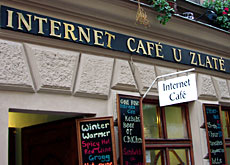Foreign investors dominate Czech media

Fifteen years after the collapse of Communism, the Czech Republic has successfully shaken off decades of state propaganda and media censorship.
But the euphoria that came with the restoration of press freedom is slowly giving way to fears that the Czech media is being stifled by foreign investors.
In Prague’s historic cafés, the wind of freedom is blowing. Customers leaf through newspapers and magazines of every kind while sipping coffee.
Many of the city’s old literary haunts, once frequented by the likes of Frank Kafka, have reinvented themselves as cyber cafés, now teeming with young people surfing the web.
The Czech Republic’s transition to democracy was accompanied by the launch of dozens of newspapers and magazines. New radio and television broadcasters sprang up like mushrooms.
Even the old information channels, abandoned by the Communist Party, were initially relaunched and kept alive by journalists.
Euphoria
Mark Kohout, head of business development in Central and Eastern Europe for the Swiss publisher Ringier, says the early 1990s was an exhilarating time.
“It was a time of total euphoria,” Kohout told swissinfo. “People were hungry for freedom, travel and information. They wanted to try everything.”
“People wanted to take maximum advantage of this freedom to publish and express opinions,” echoes Uwe Müller, director of the “Prager Zeitung”.
“I know many people who, at that time, would buy four or five newspapers a day to check the different sources and follow through every debate.”
The early 1990s was also when Western investors began moving into Prague, looking for business opportunities in a country still too weak to stand on its own feet economically.
Suffocation
Injections of Western capital have certainly helped to develop a new generation of free and independent news media. But now the predominance of foreign publishers is in danger of suffocating the country once again.
“It can’t be a good thing that the only major daily newspaper left in Czech hands is “Pravo”, formerly “Rude Pravo” (Red Law), the official mouthpiece of the Communist Party,” warns Gerold Schubert of Radio Prague.
Müller is also concerned that over-dependence on foreign investment is becoming a problem.
“Where the news itself is concerned, foreign publishers generally give their local editors a free hand. But they dictate how things are to be run on the commercial side.”
Swiss publishers such as Ringier and Edipresse – which both produce popular newspapers and magazines – are among scores of foreign media companies in the Czech Republic.
Fight to survive
Müller says the Czech media – both electronic and traditional – are fighting to reach the widest possible audience, often to the detriment of quality.
“There is a big difference between selling butter and selling news,” he says.
According to Kohout, the advertising “pie” is still too small, making it very difficult for quality publications – which are normally geared to a more limited readership – to survive.”
“The main difference between East and West probably lies in the volume of advertising, which is still much smaller here in Eastern Europe,” Kohout believes.
Many are pinning their hopes on May 2004, when membership of the European Union should strengthen the country’s economic base and raise living standards.
On average, Czechs earn only €800 (SFr1,200) a month, which explains why they are so far behind in their take-up of some of the new information technologies. Only 20 per cent of people own a computer or have a private connection to the internet.
Alan Levy, director of the weekly ‘Prague Post’, the Czechs will continue to be faced with a hard choice over the next few years.
“Czechs will have to decide whether to spend the little spare cash they have at the end of the month on internet services, or to blow it in some of the brand new supermarkets that are springing up all over the country.”
swissinfo, Armando Mombelli in Prague
Ten million people live in the Czech Republic.
The average monthly per-capita income is €800 (SFr1,200).
The unemployment rate is 8%.
The economy grew by 2.9% between 1999 and 2002.
In 2001, Swiss investment in the Czech Republic amounted to 1.9 billion francs.
1989: the ‘Velvet Revolution’ brings an end to the Communist regime in Czechoslovakia and to state propaganda. Freedom of speech and a free press are restored.
1993: the Czech Republic is born, after the secession of Slovakia.
2003: the country now has 3,000 newspapers and magazines, 70 radio stations and 20 television channels. 20% of the population has a private internet connection.
2004: on May 1, the Czech Republic will become a member of the European Union.

In compliance with the JTI standards
More: SWI swissinfo.ch certified by the Journalism Trust Initiative









You can find an overview of ongoing debates with our journalists here . Please join us!
If you want to start a conversation about a topic raised in this article or want to report factual errors, email us at english@swissinfo.ch.